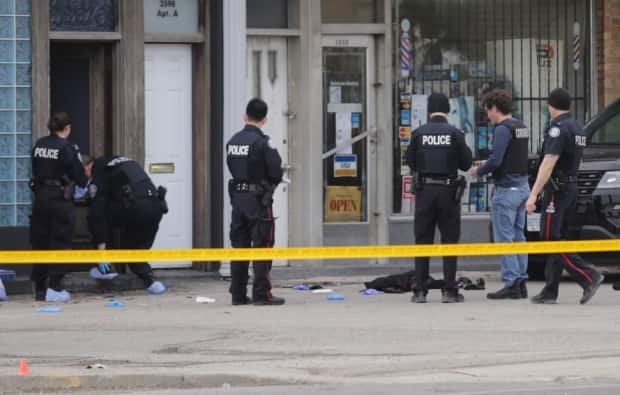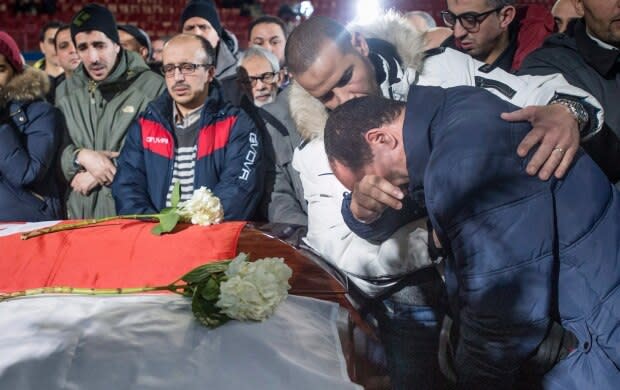Terror charges in alleged 'incel'-inspired stabbing could force reckoning of Canada's terrorism laws: experts

The decision by Canadian authorities to lay terror charges in the case of a deadly stabbing believed to be fuelled by a hatred of women could finally force a reckoning of the country's definition of terrorism, with legal minds on various sides grappling with exactly what counts as an ideological motive, national security experts say.
The charges announced Tuesday in connection with the killing of 24-year-old Ashley Noell Arzaga at a Toronto erotic massage parlour represent the first time police have treated an alleged incel-inspired attack as an act of terrorism.
Since Criminal Code offences for terrorism were first introduced in 2001, 56 out of the 57 terror charges laid in Canada have been in cases of Islamist-inspired extremism, Leah West, former Department of Justice lawyer and national security expert at Carleton University, told CBC News.
Until now, just one has been laid in connection with another ideology — in 2008, when a Toronto-area man was charged with raising funds for a Tamil militant group.
"Ideology is not defined in the Criminal Code and this will be one of the interesting things that prosecutors have to face in bringing these charges, because they're trying to prove that the incel movement is an ideology," West said.
"So how they choose to define that and prove that will be the real interesting element of this prosecution."
WATCH | Homicide at Toronto massage parlour an act of incel terrorism, police say:
One day after the terror charges were laid in the alleged incel-inspired stabbing, Canada's spy agency released its latest annual report identifying "violent misogyny" as a form of ideologically motivated extremism.
The report makes explicit reference to two violent incidents in Ontario as examples of violent extremism: the 2018 Toronto van attack and a June 2019 stabbing in Sudbury, Ont., in which the attacker referred to himself as incel and said he drew inspiration from the van attack.
Terror charges were not laid in either case. Nor were they laid in the 2014 Moncton shooting that killed three RCMP officers — also explicitly listed in the CSIS report as ideological extremism of the "anti-authority" variety.
The Criminal Code defines terrorism as an act carried out, "for a political, religious or ideological purpose, objective or cause" meant to intimidate the public by causing or attempting to cause death or serious bodily harm through violence, endangering health and safety, or disrupting an essential service.
West says she believes Tuesday's move marks a recognition that the incel movement is in fact an ideology that can drive terrorism and is "just as repugnant" as other forms of extremism that lead to violence.
Could van attacker face terror charges?
In late February 2020, police were called to a massage parlour in Toronto's north end for a stabbing that left Arzaga dead and another woman and man suffering multiple stab wounds. A 17-year-old was charged with first-degree murder and attempted murder.
Shortly after the incident, Toronto police contacted the RCMP's Integrated National Security Enforcement Team (INSET), "after uncovering that this crime was potentially a 'terrorist activity,'" the RCMP said in a news release.
An investigation found that the, "crime was in fact one in which the accused was inspired by the ideologically motivated extremist movement commonly known as incel," the release said.
The charges against the 17-year-old, who cannot be named under the Youth Criminal Justice Act, were subsequently upgraded to terror-related charges.
Incel, or "involuntary celibate," is a misogynistic subculture that began online and remained relatively obscure until it was linked to cases of violence and murder in the mid-2010s. Self-identified incel followers share a frustration over their inability to find a romantic or sexual partner, often blaming women for their feelings of rejection.
The term gained newfound attention two years ago following the Toronto van attack, after Alek Minassian tore through a stretch of a Toronto sidewalk in a rented van, killing 10 people and injuring 16 others. Minassian would later vent his sexual frustrations to police, saying in an interview he was inspired by incel ideology.

Asked if it was considering reviewing Minassian's charges to now include terrorism, Ontario's Ministry of the Attorney General declined to respond, saying it would be inappropriate to comment given his case is currently before the courts.
If Minassian is found guilty at trial, there's little chance he would ever be released from prison.
As for why he wasn't charged with terror offences, West said it's possible that there simply may not have been enough known about the incel phenomenon at the time.
"Prosecutors might feel capable of actually proving that this movement does rise to the level of an ideology that motivates violence that maybe didn't exist in 2018," she said.
Move 'long overdue,' says expert
"Terrorism comes in many forms and it's important to note that it is not restricted to any particular group, religion or ideology," the RCMP said Tuesday.
Yet the "uneven" application of terror charges in Canada has long been under scrutiny by some national security experts, including University of Toronto law professor Kent Roach.
For Roach, the application of terror charges in this case raises the question of why similar charges haven't been laid in other ideologically motivated instances, such as that of Alexandre Bissonette, who fatally shot six men as they prayed in a Quebec City mosque in 2017, despite a judge defining his motive as "a visceral hate toward Muslim immigrants."

"To me, it kind of defies logic to think that what he did was not a terrorist activity, so I think these charges perhaps belatedly are moving in a more even-handed direction," Roach told CBC News.
Roach acknowledged adding terror charges would not necessarily affect the maximum sentence the accused could face in the massage parlour case.
Still, he applauded the move by prosecutors, saying the application of terror charges to acts inspired by other ideologies, including far-right extremism and the incel movement, is "long overdue."
"I think we have been caught in the momentum and memory of 9/11 for far too long," Roach said.
What counts as terrorism 'a moving target'
Adding a terror dimension to the case will undoubtedly make it more challenging for the prosecution to make its case, Roach pointed out. Not only will the Crown need to argue that the incel movement constitutes an ideology, he said. It will also need to show the attacker's goal was to intimidate a segment of the population. In this case, likely women.
Toronto criminal lawyer Nader Hasan is more skeptical. While terror laws have been unevenly applied in Canada, the concept of terrorism itself has been "a moving target," he said.
"These laws are tremendously broad, such that what is 'terrorism' is not so much a function of what the law says but rather a function of what the police and prosecutors believe it to be in their minds," he said.
"The decision to charge this suspect with a terrorism offence is a departure ... But the second problem remains: The terrorism laws are poorly drafted."


